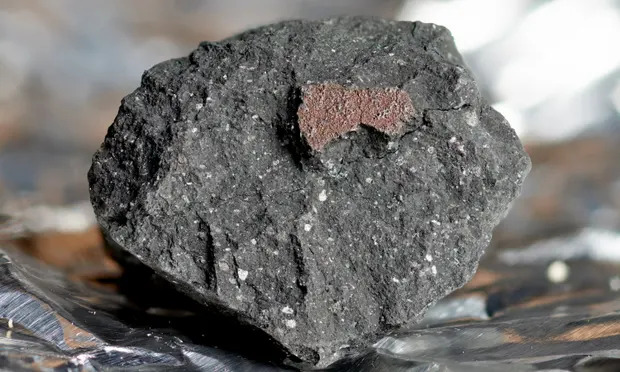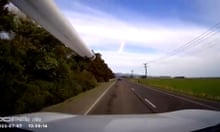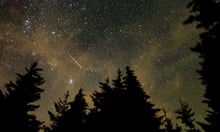Rock that crashed into family’s driveway provides compelling evidence water arrived on asteroids.
 Most of the Winchcombe meteorite was recovered just hours after its spectacular fireball lit up the skies over the UK in February 2021 during lockdown. Photograph: Trustees of the Natural History Museum/PA
Most of the Winchcombe meteorite was recovered just hours after its spectacular fireball lit up the skies over the UK in February 2021 during lockdown. Photograph: Trustees of the Natural History Museum/PA
–
Water covers three-quarters of the Earth’s surface and was crucial for the emergence of life, but its origins have remained a subject of active debate among scientists.
Now, a 4.6bn-year-old rock that crashed on to a driveway in Gloucestershire last year has provided some of the most compelling evidence to date that water arrived on Earth from asteroids in the outer solar system.
The Winchcombe meteorite, one of the “most pristine” available for analysis, offered scientists “a tantalizing glimpse back through time to the original composition of the solar system 4.6bn years-ago”, said Dr Ashley King, a research fellow at the Natural History Museum in London and author of a new paper on the space rock.
A prevailing theory is that the Earth was barren when it formed, as the inner region of the solar system was too hot for water to condense. The boundary of the region where ice could form in the early solar system is known as the frost line, and is located in the modern asteroid belt. Scientists think that water could have arrived to Earth later, raining down in icy meteoroids and large impacts.
However, there are competing theories, including that water was brought on comets – made mostly of ice and dust – or other similar bodies.
The latest analysis adds weight to the theory that asteroids made a leading contribution to water on Earth. Most of the Winchcombe meteorite was recovered just hours after its spectacular fireball lit up the skies over the UK in February 2021 during lockdown. One of the largest pieces was discovered on the driveway of the Wilcock family home, and a few smaller pieces were found in nearby gardens.
It is the first-ever carbonaceous chondrite meteorite – the oldest class of meteorites, which contain materials present during the formation of the solar system – to have been found in the UK. Crucially, it was collected within hours of being detected, before any rainfall, and analysed almost immediately, making it a rare uncontaminated specimen.
The incoming meteorite was also recorded by 16 dedicated meteor cameras, and numerous doorbell and dashcam videos, meaning that scientists could produce an accurate trajectory of where it came from in the solar system. By contrast, most of the 70,000 known meteorites have been found without their impact being recorded – in some cases millions of years after they landed. “They’re just random rocks that have come to us from space,” said King.
The analysis, published in the journal Science Advances, concludes that the meteorite originated from an asteroid body somewhere near Jupiter. The research also found that the ratio of hydrogen isotopes in the water closely resembled the composition of water on Earth.
“Meteorites like Winchcombe are a pretty good match [to] the water in the Earth’s oceans and suggests asteroids were the main source of water,” said King.
Extracts from the Winchcombe meteorite also contain extraterrestrial amino acids – prebiotic molecules that are fundamental building blocks for the origin of life.
As the composition of the Winchcombe meteorite is so pristinely preserved, the analysis suggests that similar asteroids have played a significant role in delivering the ingredients needed to kickstart oceans and life on early Earth.
–
Topics














